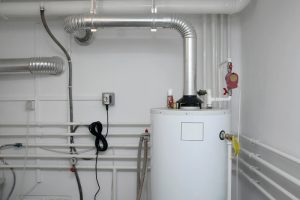 You may have heard the term “hard water” before, especially if you’ve ever read any of our other blogs. It can sound like a pretty intimidating term, in regards to your water quality, but fortunately it’s not actually harmful to your health (it’s another story for your plumbing system though, which we’ll get to below).
You may have heard the term “hard water” before, especially if you’ve ever read any of our other blogs. It can sound like a pretty intimidating term, in regards to your water quality, but fortunately it’s not actually harmful to your health (it’s another story for your plumbing system though, which we’ll get to below).
Hard water describes water that has an excess of the minerals calcium and magnesium. And in your Glenview, IL water heater, this hard water causes a process called scaling—when the deposits are left behind inside the tank. In a faucet it’s fairly easy to get rid of scaling, but in a water heater it’s a different story.
How Do Deposits Get Left Behind?
At some point, you might have noticed a flaky white, green, or yellow buildup around your faucet handle and even around the drain. This is the evidence of scaling—those deposits we mentioned above that get left behind due to hard water. These minerals don’t simply drain away as easily as non-affected water does, and can cling to a metal surface even when you have your faucets turned on full blast.
This causes the mineral deposits to get lodged inside your plumbing—including plumbing that leads into and out of your water heater. The bottom of your water heater tank is no exception.
Will Scaling Damage a Water Heater?
Scaling affects water heaters in a number of ways. For instance, buildup can develop in the pipes and effectively block water from moving through as easily as its supposed to, if it develops a thick enough layer of mineral deposits.
What’s even more common, however, is damage occurring to the actual tank of your water heater. What happens is that minerals build up at the bottom of your rank and make it difficult for the water heater to do its job, decreasing the efficiency of the system, and resulting in unbalanced pressure levels. These minerals will eventually create corrosion problems, too.
How to Tell if Scaling Is Occurring
Maybe the most apparent sign that scaling has occurred in your water heater is the noise it makes when it rattles in the tank. This is often described as a popping or knocking sound, and it occurs as steam bubbles attempt to escape past the layer of sediment at the bottom of the tank.
Scaling also can impact the temperature of the water, which is especially true with tankless water heaters, since the deposit coat the heat exchanger and make it harder for water to pick up heat. Another sign of scaling is low hot water pressure—caused by the scaling clogging up the pipes that lead out of your water heater.
If you suspect or discover that scaling has occurred, you’ll want to contact a professional plumber to flush your water heater, or to repair or replace it in the case of a compromised tankless system. To prevent scaling damage in the future, your best option would be to have a whole-home water softener installed, which will solve a number of other problems throughout your household beyond water heater protection!
For expert plumbing service, installations, or maintenance contact Reliance Plumbing Sewer & Drainage, Inc. Our knowledgeable plumbers serve the North Shore and Northwest Chicago suburbs. Rely on Reliance!
